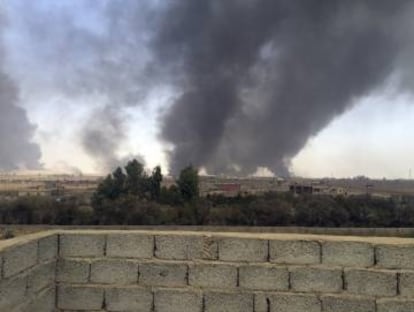Spanish Jihadist chatter on the rise say experts, with sights set on Spain
Counter-terrorism analysts are detecting a greater amount of propaganda that is written in Spanish or, in the case of videos, contains Spanish subtitles


Spanish counter-terrorism authorities have issued an alert about “the increase in mentions of our country” in recent propaganda material produced by the so-called Islamic State (ISIS), including text documents, videos and graphs.
Jihadists are now writing in Spanish, and even analyzing the political situation in Spain through written reviews of election results.
This is raising Spain’s profile on ISIS’ communication networks. “The progressive increase of texts and releases translated into Spanish is giving our country growing relevance from a propaganda point of view, and increasing the possibility of action by an autonomous terrorist working on our territory,” terrorism experts say.
The police and the judiciary have ramped up their efforts, detaining growing numbers of suspects with each passing year
Potential targets include crowded areas, police officers, Christians, Jews and homosexuals.
“...In any place that you consider a valid target to punish criminal Spaniards... through any available means,” reads a document dated July 18 and released by the Wafa Media Foundation, which supports ISIS. The foundation’s spokesman has encouraged citizens of the Maghreb region, which encompasses Morocco, Tunisia, Mauritania and Libya, to attack Spanish individuals.
Following the Spanish general election of June 26, a media group called Ifriqiya Media, which is the official mouthpiece of Al Qaeda in the Islamic Maghreb, wrote the following analysis: “26-J: Everyone has lost, except for Morocco.” The document went on to examine the Spanish election from the viewpoint of its impact on Morocco’s prolonged conflict in Western Sahara.
Recent attacks across the world – Orlando on June 13, Nice on July 14 and Normandy on July 26 – have underscored how one of ISIS’s main tools is its propaganda machine, now that it is losing part of its physical territory. The July 2015 issue of Dar al Islam magazine explicitly encouraged readers to attack Christians as a priority target.
Spanish counter-terrorism experts say that propaganda videos with Spanish subtitles have been cropping up regularly since the beginning of this year. One such video, produced by a jihadist channel from Anbar, a district of the Islamic State located in Iraq, was titled “The predators’ incursions” and had Spanish subtitles.

Another 14-minute video titled “The path of the just fathers” and aimed at attracting new recruits also has Spanish subtitles. All these messages are being disseminated from wilayas, or districts of the Islamic State, “which entails action by various individuals following specific guidelines from a central organization,” say Spanish experts.
The Spanish flag has also been seen in an image headlined “One religion, one caliphate” and showing an individual with a black ISIS flag in his hands and 12 other flags, including the Spanish one, at his feet.
A graph made by Amaq Agency, ISIS’ official production company, shows 100 suicide attacks perpetrated by its followers in the month of June. All text included in the chart is written in Spanish.
In fact, the Spanish is so good that experts suspect that some of the copy is being written by native Spaniards, with the goal of encouraging action by “homegrown terrorists who are frustrated at their inability to travel to Syria and Iraq to fight side by side with the jihadists, and instead may choose to carry out attacks in their own country of birth or residence.”
186 Spaniards have traveled to conflict zones
Since 2004 (the year of the jihadist-inspired attacks against commuter trains in Madrid), counter-terrorism authorities have launched 181 operations against Islamist terrorists, resulting in 692 arrests. In recent years, the police and the judiciary have ramped up their efforts, detaining growing numbers of suspects with each passing year: eight in 2012, 20 in 2013 and 36 in 2014.
Most arrests are tied to recruiting activities in Spain, including the practice of sending individuals to conflict zones in Syria and Iraq. Many of the raids have been carried out in the northeastern region of Catalonia.
So far this year, there have been 15 operations in Spain and one joint action with Morocco. Spanish secret services have identified 186 Spaniards or residents in Spain who have traveled to Syria or other conflict zones, of whom at least 31 may have died there. Authorities are also aware of 25 who have returned to Spain, 15 of whom are in prison and the remaining 10 walking free.
English version by Susana Urra.
Tu suscripción se está usando en otro dispositivo
¿Quieres añadir otro usuario a tu suscripción?
Si continúas leyendo en este dispositivo, no se podrá leer en el otro.
FlechaTu suscripción se está usando en otro dispositivo y solo puedes acceder a EL PAÍS desde un dispositivo a la vez.
Si quieres compartir tu cuenta, cambia tu suscripción a la modalidad Premium, así podrás añadir otro usuario. Cada uno accederá con su propia cuenta de email, lo que os permitirá personalizar vuestra experiencia en EL PAÍS.
¿Tienes una suscripción de empresa? Accede aquí para contratar más cuentas.
En el caso de no saber quién está usando tu cuenta, te recomendamos cambiar tu contraseña aquí.
Si decides continuar compartiendo tu cuenta, este mensaje se mostrará en tu dispositivo y en el de la otra persona que está usando tu cuenta de forma indefinida, afectando a tu experiencia de lectura. Puedes consultar aquí los términos y condiciones de la suscripción digital.








































